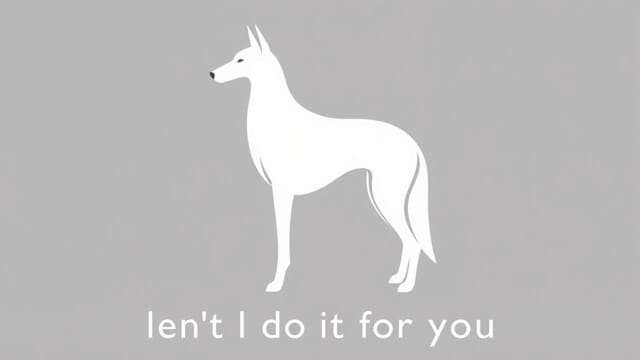In the realm of art, music, and literature, certain works stand out because of their unique titles that spark curiosity and invite interpretation. ‘Didn’t I Do It for You Borzoi?’ is one such intriguing phrase that captures attention immediately. While it may sound puzzling at first, this expression can be unpacked to reveal deeper meanings tied to emotions, relationships, and even cultural references. Exploring the phrase allows us to reflect on themes of effort, recognition, loyalty, and identity. This topic delves into the possible meanings behind ‘Didn’t I Do It for You Borzoi?’ and its broader implications, offering insights into language, symbolism, and emotional resonance.
The Surface Meaning of the Phrase
At face value, the phrase ‘Didn’t I Do It for You Borzoi?’ suggests a question or a plea, perhaps coming from someone who has made an effort or sacrifice for another and is seeking acknowledgment. The phrase is structured as a rhetorical question, implying a sense of frustration or disappointment that their actions have not been fully appreciated.
The word ‘Borzoi’ at the end adds an unusual twist. A Borzoi is a breed of Russian hunting dog known for its grace, speed, and elegance. This specific mention of ‘Borzoi’ can be interpreted in several ways it could be a term of endearment, a metaphor, or a symbolic reference. Understanding the Borzoi’s characteristics helps us unlock possible layers in the phrase.
Why Borzoi?
- Symbol of Grace and Loyalty: Borzois are known for their noble and loyal nature, which could imply that the speaker feels they have been faithful or devoted.
- Exotic and Unique: The breed is relatively rare and carries a sense of exoticism, suggesting that the addressed ‘Borzoi’ is special or distinct.
- Metaphorical Use: It might represent a person, group, or idea that embodies qualities associated with the Borzoi.
Emotional Undertones in the Phrase
The phrase carries an emotional weight that touches on themes of effort, recognition, and perhaps unreciprocated devotion. When someone asks, ‘Didn’t I do it for you?’ it suggests they feel their contributions or sacrifices have gone unnoticed or unappreciated.
This kind of expression often arises in relationships whether romantic, familial, or friendships where one party feels that their goodwill or actions have not been acknowledged. The question seeks validation and reassurance, highlighting the human desire to be seen and valued.
Relating to the Audience
Many people can relate to the feeling conveyed by this phrase, making it resonate deeply. Whether it is in work environments, personal relationships, or social dynamics, the plea for recognition is universal.
Possible Interpretations and Contexts
The phrase ‘Didn’t I Do It for You Borzoi?’ can be viewed through different lenses depending on context. Here are some possible interpretations:
1. A Literal Dialogue
In a literal sense, the phrase could be part of a dialogue between two individuals, where one person (referred to as Borzoi) is being addressed with this rhetorical question to remind them of the efforts made on their behalf.
2. Artistic or Literary Title
The phrase could serve as a creative title for a poem, song, or story, inviting readers or listeners to explore the narrative behind the emotional query. It creates intrigue by combining a familiar emotional appeal with an unexpected word, ‘Borzoi,’ adding uniqueness.
3. Symbolism in Communication
Symbolically, ‘Borzoi’ could represent a stand-in for a group or individual who expects loyalty or service. The phrase then reflects the tension between expectation and acknowledgment, common in social and professional relationships.
The Role of Unique Titles in Creative Expression
Titles like ‘Didn’t I Do It for You Borzoi?’ exemplify how unusual phrasing can capture attention and stimulate curiosity. In creative works, an unconventional title serves multiple purposes:
- Engagement: It draws the audience in by sparking questions.
- Setting Tone: The phrase sets an emotional or thematic tone before the work even begins.
- Memorability: Unique titles are easier to remember and discuss.
- Symbolism: They can encode deeper meanings or references, inviting interpretation.
By combining an emotional question with the word ‘Borzoi,’ the phrase achieves all these aims effectively.
Language and Emotion: How Words Convey Complex Feelings
Language is a powerful tool to convey complex emotions succinctly. A simple rhetorical question such as ‘Didn’t I do it for you?’ carries within it layers of vulnerability, frustration, and desire for acknowledgment. Adding a specific noun like ‘Borzoi’ personalizes and colors the expression, making it more evocative.
Such combinations remind us how language evolves beyond dictionary meanings into tools for emotional and symbolic communication. The phrase’s emotional resonance lies in its ability to evoke a story or a shared experience with minimal words.
Impact on Communication
- Invokes empathy: Listeners or readers may recall moments when they sought recognition.
- Triggers curiosity: The unusual element encourages deeper reflection or engagement.
- Encourages interpretation: Opens space for multiple meanings depending on personal context.
Embracing Ambiguity and Depth
‘Didn’t I Do It for You Borzoi?’ is more than just a phrase; it is an invitation to explore human emotions, loyalty, and recognition. The mixture of a rhetorical question with the symbolic use of ‘Borzoi’ creates a unique linguistic artifact that sparks curiosity and reflection. Whether interpreted as a literal question, a creative work title, or a symbolic expression, it touches on universal themes of effort and acknowledgment that everyone can relate to.
Ultimately, phrases like this showcase the beauty of language as a medium for storytelling and emotional expression. They encourage us to think beyond the obvious, explore symbolism, and connect with the shared human experience of seeking appreciation and meaning in our actions.
